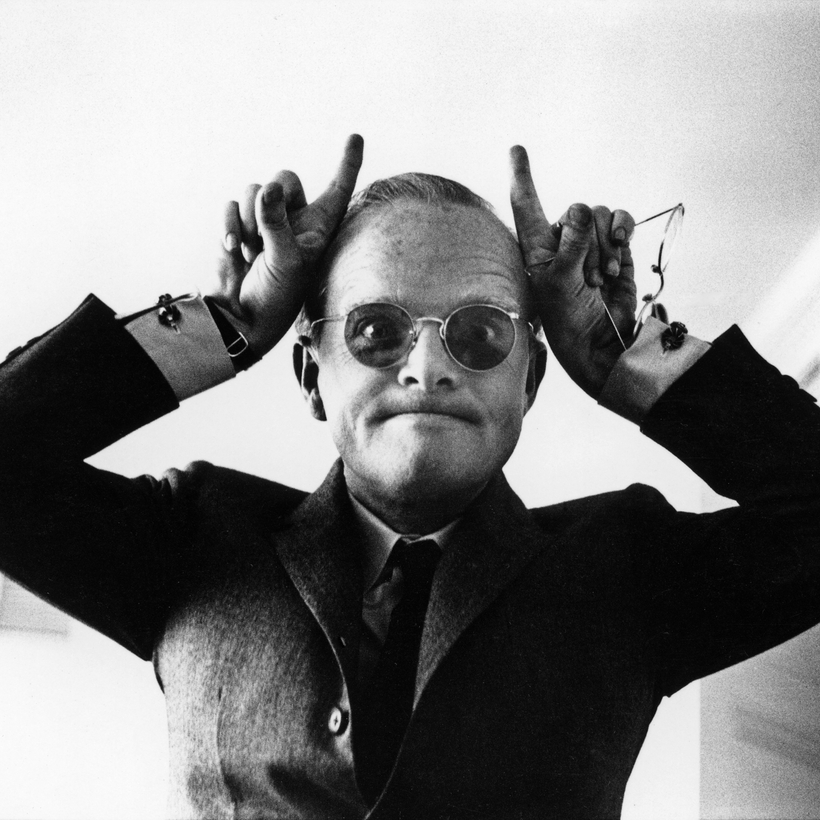Truman Capote had gone to die at the home of one of the few friends he had left who would still receive him. Joanne Carson, The Tonight Show host Johnny Carson’s second wife, had steadfastly remained close to the author after most of his high-society “swans” had shunned him or died without forgiving him. “He looked the color of paper,” she recalled, “just white.” Carson took Capote’s pulse, which was “very fluttery and very weak.... He said, ‘I think I’m dying.’ I said, ‘Truman, don’t you dare. You die, and I’ll never speak to you again.’ We both laughed.”
When his pulse continued to weaken, Carson wanted to call the paramedics. But, she said, Capote “grabbed hold of me again and said, ‘No. No paramedics, no doctors. If you truly love me you will let me go.’” Carson did call the paramedics, but it was too late. He died in her arms, in her house on the edge of Bel Air on August 25, 1984, at the age of 59.
But it’s we who have never been able to let Truman Capote go.

Five years after his death came Tru, a one-man play written by Jay Presson Allen which starred Robert Morse as Capote, alone but for his poinsettias in his U.N. Plaza apartment on Christmas Eve (a holiday that Capote loathed).
Then there was Bennett Miller’s 2005 film, Capote, for which the late, great Philip Seymour Hoffman won an Academy Award for his uncanny portrayal of the writer at work on In Cold Blood. The following year, the English actor Toby Jones would play Capote in the unjustly overlooked Infamous. More recently there’s The Capote Tapes, a documentary based on recordings, many of them made by George Plimpton for his 1997 oral biography, Truman Capote: In Which Various Friends, Enemies, Acquaintances, and Detractors Recall His Turbulent Career. Like Tennessee Williams and Edith Wharton and William Faulkner and James Baldwin, Capote reached us in ways we can never quite forget or be done with.
Now comes Laurence Leamer’s highly engaging Capote’s Women: A True Story of Love, Betrayal, and a Swan Song for an Era. What Leamer did in his best-selling The Kennedy Women he has now done for the (mostly) high-born women Capote cultivated, worshipped, and envied: Barbara “Babe” Paley, Nancy “Slim” Keith, Pamela Churchill Harriman, Gloria Guinness, Lucy Douglas “C. Z.” Guest, Princess Marella Agnelli, and Jackie Kennedy’s sister Princess Lee Radziwill. (Joanne Carson and Katharine Graham were his junior-varsity swans.)
Leamer tells each woman’s story, skillfully intertwining their extraordinary lives of privilege and heartbreak, luxury and glamour, mostly derived from the rich and powerful men they married. Enduring infidelities and abuse, they clung to their high perch, in an era that unashamedly worshipped wealth, power, and beauty.

For the Capote raised in New York by Lillie Mae “Nina” Capote—his twice-married, social-climbing, alcoholic mother—these society swans symbolized everything he had wanted for himself: money, opportunity, acceptance at the highest level of society. But the Capote born in modest conditions in the Deep South, before Lillie Mae re-married and became known as Nina, despised his swans’ unthinking sense of privilege and cluelessness as to how most people lived. He was the eternal outsider, taking notes, hoping to bridge the chasm between Monroeville and Fifth Avenue. In the end, he found that chasm unbridgeable.
He loved them and he hated them, and that dichotomy became the spur for Capote’s last, notorious, unfinished work, Answered Prayers. His ambition was high: this would be his Age of Innocence, his In Search of Lost Time. Having learned from his own earlier, groundbreaking “nonfiction novel,” In Cold Blood, he would weave the secrets he’d gleaned from their glamorous lives to lay bare the louche and sometimes criminal behavior of the upper crust. In other words, he spilled the beans, betraying the confidences entrusted to him by these unhappy women trapped in their platinum cages.
The Capote born in modest conditions in the Deep South despised his swans’ unthinking sense of privilege and cluelessness as to how most people lived.
Norman Mailer, another 20th-century novelist whose towering personal reputation now overshadows his work, believed that Capote “was very divided.” He “had to feel his social life was swallowing him.... His relations with all these people had to have its reverse side, which is that he’d slowly get to hate them more and more because they swallowed his talent.”

Capote boasted that he’d designed his Answered Prayers like a gun, but it was a gun that he turned on himself. He drank too much and took too many recreational drugs (and spent way too much time at Studio 54!). Work on the masterpiece dragged on, unfocused and unfinished. To satisfy his publisher, he finally allowed one of the chapters, “La Côte Basque, 1965,” to be published in Esquire in November 1975. It would prove to be a short story as suicide note: The swans whose secrets he betrayed in the text—Babe Paley most prominently—sent up a furious howl. Suddenly, the doors to the best apartments, restaurants, and watering holes in New York were slammed shut in his face.
Mailer believed that Capote “didn’t understand the social force of New York—that even he could be eighty-sixed … that certain things could not be forgiven. The way he treated Babe and Bill Paley, for instance, was not going to be forgiven.”
Capote’s Women insightfully outlines one of the most spectacular crack-ups of any 20th-century American writer since F. Scott Fitzgerald, a tale worthy of Madame de Sévigné’s letters to her daughter about the intrigues and treacheries at the court of Louis XIV.

When asked by his publisher if he thought the failure of Answered Prayers was “a tragic loss or a saving grace,” Leamer answered, “If Capote had published a book based largely on what we know he had written, it would have been savaged by honest critics. But if he had written the book he set out to write, he would have had his masterpiece.”
“That book had probably died in him ten years earlier,” Norman Mailer believed. “One of the things we do in our lives as writers is to keep saving certain books, but when we get to the point where we think we’re ready to write them, we no longer can. The material has crumbled into powder.”
Capote’s Women: A True Story of Love, Betrayal, and a Swan Song for an Era, by Laurence Leamer, will be published on October 12 by G. P. Putnam’s Sons
Sam Kashner, a Writer at Large for Air Mail, is a co-author of Life Isn’t Everything: Mike Nichols, as Remembered by 150 of His Closest Friends

